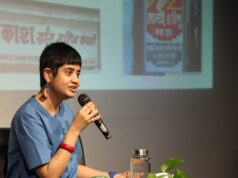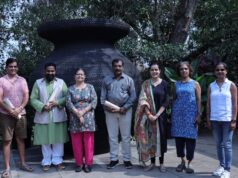What happens when tools designed for safety and efficiency start dictating people’s lives instead? That was the central question explored at ‘Last Call for Tomorrow,’ a session hosted on the occasion of MOG Sunday, at the Museum of Goa, on Sunday, following the screening of TAAK, a film directed by Udit Khurana.
Presented by the Museum of Imagined Futures (MOIF) and the Storiculture Impact Fellowship, the event explored how digitalisation shapes our everyday lives, often in ways we do not anticipate.
The conversation turned to technologies that appear neutral on the surface but end up creating new vulnerabilities. Biometric IDs, workplace trackers and smart devices may be promoted as solutions for safety, yet they quietly transform relationships between workers and employers, citizens and the state. As Mathivanan Rajendran, producer of the film, pointed out: “Technology is rarely neutral. It comes embedded with power structures and it’s important to ask: safety for whom, and at what cost?”
The film, that was screened as part of the event, provided an entry point to such reflections. Set against the backdrop of night-shift security work, TAAK illustrates how mandatory tracking devices can erode trust and autonomy. For Vedika Pareek, a part of the business and legal vertical at the Storiculture Company, the purpose of telling these stories lay in opening up dialogue rather than providing fixed solutions. “Cinema can create empathy, but the real conversation happens afterwards — in spaces like this,” she explained.
The session also underlined how digitalisation produces uneven effects across society. While urban professionals may view devices as tools of convenience, for workers and vulnerable groups the same technologies often become instruments of control. Vedika noted that this gap in experience was central to how the film was researched and written: “When we talk about digital futures, we must ask who is included and who is excluded.”
The discussion also examined how digital tools are reshaping labour in India’s rapidly expanding service economy. What is framed as efficiency can become coercion when workers have little choice in whether or not to comply. As Karan Saini, security researcher and public interest technologist, cautioned, “These technologies don’t just monitor how we work — they start to decide how we live.”
Underlying the discussion was a shared call to resist treating digitalisation as inevitable. The session stressed the need to imagine futures that prioritise human dignity over data-driven control. As another panellist said: “We need to stop seeing technology as destiny. The future is still ours to shape.”
Through ‘Last Call for Tomorrow,’ MOIF aims to make such conversations accessible beyond academic and policy spaces. By combining film screenings with intimate dialogue, the series invites citizens, cultural thinkers, and technologists to pause and reflect on the societies we are building — before those futures arrive.






